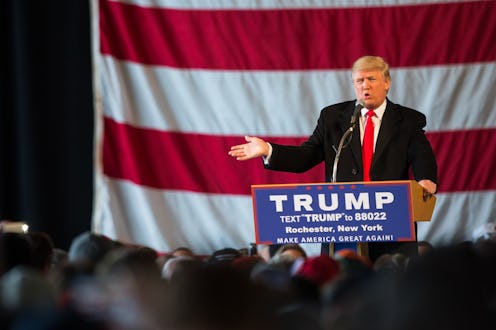News
New York Has A Bunch Of Delegates Up For Grabs
The presidential candidates are heading into a very important primary in New York on April 19, with a big chunk of delegates up for grabs. Anyone following the 2016 primary season has likely spent some time reeling at just how complicated the delegate allocation system can be, and New York is no exception. Is the New York primary winner-take-all? The answer is kind of, but only for one party.
All states allocate their Democratic delegates proportionally in one way or another. Some states allocate delegates to a candidate based on the percentage of the popular vote he or she wins in the primary or caucuses. Other states distribute their "at-large" delegates proportionally based on the statewide vote and congressional district delegates based on how many votes the candidates get within each district. New York, which has 247 Democratic delegates, follows the latter state-district distribution model.
The Republican Party does things differently in New York, as it does in many other states. It's not a strict winner-take-all state, because the candidate who gets the most, or even a majority, of votes in the state doesn't get all its 95 Republican delegates. In certain circumstances, though, a candidate may win all of a certain type of delegate in New York.
New York has three automatic, 11 at-large, and 81 congressional district delegates, Josh Putnam at Frontloading HQ reports. The 14 automatic and at-large delegates can all be won by a Republican candidate if he wins over 50 percent of the statewide vote. If no candidate does so, the delegates will be awarded proportionally. Also note that there's a 20 percent threshold, which means a candidate must earn at least that much of the statewide vote to be eligible for any of these 14 delegates. Say a candidate doesn't get over 20 percent: any of the 14 delegates that would have gone to him proportionally without that threshold go to the candidate who received the most votes statewide.
Congressional district delegates — the biggest haul of the day — are allocated in a similar way, Putnam explains. Each of New York's 27 congressional districts has three delegates up for grabs. If a candidate gets a majority of the vote (remember: that means over 50 percent, not just more than any other candidate) within a congressional district, he gets all three delegates. There is also a 20 percent threshold to qualify for this type of delegate. If more than one candidate gets above 20 percent of the vote but nobody has a majority, then the one with the most votes gets two of the three available delegates, and the second-place finisher within the district gets the last one.
That's a lot of numbers; let's put them in the context of the current race, using Real Clear Politics' polling average for the Republican New York primary as a guide. Donald Trump has been hovering just above 50 percent in his home state, with Sen. Ted Cruz and Gov. John Kasich teetering on the 20 percent qualifying threshold. If these numbers reflect how primary voters statewide cast their ballots on April 19, then Trump would get all 14 at-large and automatic delegates. Of course, Trump's majority lead is fragile going into New York, and he may very well perform below 50 percent, freeing up some of those at-large delegates to Cruz and Kasich, so long as they are each able to pull off at least 20 percent of the vote statewide.
It's harder to predict what would happen in the state's 81 congressional districts. Kasich and Cruz could clear 20 percent in several of them, but Trump is likely to be the plurality winner (meaning he'd have the most, but not necessarily a majority) in many of them. So Cruz and Kasich can expect to walk away with some delegate scraps from a second-place finish here or there and maybe even a first-place performance there, but probably shouldn't hold their breath for much else.
The way New York allocates its delegates, and Trump's advantage in the state, don't make it a likely place for Kasich and Cruz to make much headway on their mission to play delegate-keep-away from Trump. The state is winner-take-all in certain circumstances; polling suggests Trump has a chance of taking all in many cases, and most in others.
